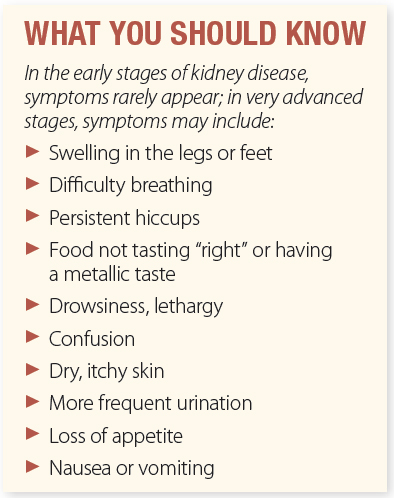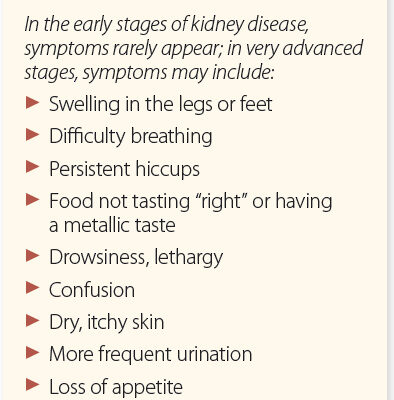Raising Awareness About Kidney Disease
Kidney disease may not be one of the most talkedabout health topics, but perhaps it should be: An estimated 37 million adults in the United States may have chronic kidney disease (CKD), but the majority of people who have it are unaware of their condition, according to the National Kidney Foundation (NKF).
“Chronic kidney disease (CKD) is a very common disease with a high mortality risk, but not many people know about it,” says Line Malha, MD, a nephrologist at Weill Cornell Medicine. “We need to increase awareness of kidney disease.”
What Your Kidneys Do
Your kidneys function as a filtration system for your blood. The kidneys contain structures called nephrons, which are composed of clusters of tiny blood vessels, tubules, and collecting ducts; each kidney contains more than a million nephrons.
The kidneys remove toxins, excess fluid, and other waste products. They also help regulate amounts of substances that play an important role in bone health, red blood cell production, and regulating blood pressure.
Assessing Kidney Function
Dr. Malha says it’s very important to have annual physical exams and blood tests that include an evaluation of your kidney function. One substance measured on a standard blood test is creatinine. “Creatinine is a waste product filtered out by the kidneys,” explains Dr. Malha.
“Creatinine is used to interpret the glomerular filtration rate, or GFR, which tells us how well the kidneys are filtering the blood.”
Another indicator of kidney function is a substance called albumin, which consists of protein fragments that are too large to pass through the filtration system into the urine if the kidneys are working properly. The albumin level is checked with a urine sample.
“When urine albumin is high, it indicates the possibility that the filter is more ‘leaky’ than it should be,” explains Dr. Malha. “An albumin level above 30 milligrams per gram (mg/g) is called microalbuminuria, and a level above 300 mg/g is macroalbuminuria.”
If test results suggest kidney function is impaired, further screening tests may include laboratory testing (blood and urine), a kidney ultrasound, and sometimes a biopsy, in which a tissue sample is taken and then examined.

Risk Factors for Kidney Disease
“Diabetes and hypertension (HT) are the top risk factors for kidney disease in U.S. adults. This is why earlier detection and better management of diabetes and HT are key for protecting kidney health,” emphasizes Dr. Malha. “Over time, diabetes and HT damage blood vessels. The filtering apparatus in the kidneys is made up of clusters of tiny blood vessels, so vascular damage can make them less functional. On biopsy, you can see the damage.” Other risk factors include:
- Autoimmune diseases, such as lupus, which are more common in women than in men
- A history of preeclampsia (new onset of hypertension) during pregnancy
- Being treated with chemotherapy
- Taking medications that can be toxic to the kidneys, such as nonsteroidal anti-inflammatory drugs (ibuprofen, naproxen)
- A family history of CKD or kidney failure. Dr. Malha adds that some types of kidney disease have genetic or congenital causes.
Treatment Options
Several types of medications may be used to treat kidney disease. Since diabetes and hypertension are the two top causes of kidney disease, many medications used to treat kidney disease also treat these conditions. For example, HT drugs also used for kidney disease include:
- ACE inhibitors, such as lisinopril (Prinivil, Zestril), benazepril (Lotensin), and enalapril (Vasotec)
- Angiotension II receptor blockers (ARBs), such as telmisartan (Micardia), losartan (Cozaar), and valsartan (Diovan)
- Aliskiren (Tekturna), a renin inhibitor
“Medications originally formulated for diabetes, called SGLT2 inhibitors, including dapagliflozin (Farxiga) and empagliflozin (Jardiance), have also been approved by the U.S. Food and Drug Administration to help delay the worsening of CKD,” notes Dr. Malha. “An added benefit of these drugs is that they also help lower blood pressure.”
One of the newest medications approved for CKD is finerenone (Kerendia). This drug is used for treating CKD associated with type 2 diabetes.
Dr. Mahla stresses that, if a person with CKD also has diabetes or high blood pressure, good management of these conditions is essential.
If the progression of CKD cannot be halted, kidney failure results. If that occurs, the options remaining are a kidney transplant or dialysis.
This may sound grim, but the upside is that, if kidney disease is identified and treated in the early stages, there’s a much lower risk of ending up with kidney failure.
The post Raising Awareness About Kidney Disease appeared first on University Health News.
Read Original Article: Raising Awareness About Kidney Disease »


